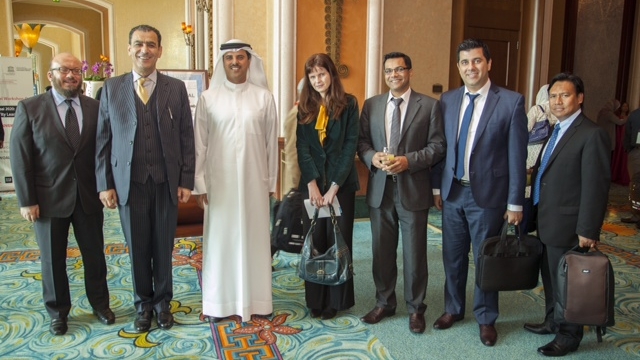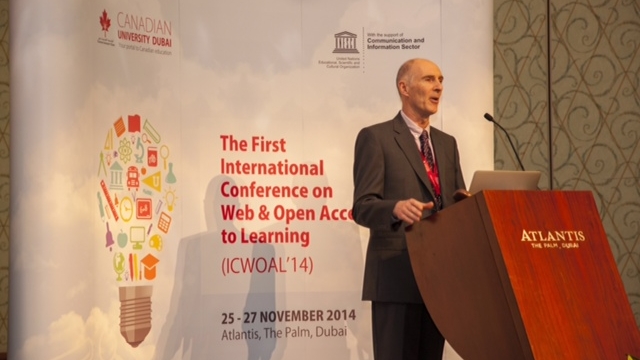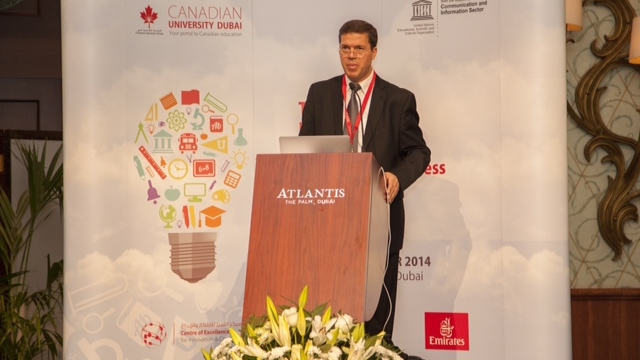November 25, 2014: The Canadian University Dubai, with technical support from UNESCO and the Institute of Electronics & Electrical Engineering (IEEE), opened the First International Conference on Web & Open Access to Learning (ICWOAL’14), at Atlantis Resort, The Palm, Dubai today.
In his welcome address, Mr. Buti, Chancellor of Canadian University Dubai, said the university was honoured to host the region’s first conference on open access to learning. Paying tributes to the leadership of President HH Sheikh Khalifa bin Zayed Al Nahyan and HH Sheikh Mohammed bin Rashid Al Maktoum, Vice President and Prime Minister of UAE and Ruler of Dubai, he said the UAE was at the forefront in the use of digital technologies. This is due to the increasingly central role ICT occupies in the government’s agenda as an enabling infrastructure for developing a truly world-class educational infrastructure and workforce.
Prof. Karim Chelli, President and Vice-Chancellor of Canadian University Dubai said the university was honoured to collaborate with UNESCO and IEEE UAE chapter to host the ICWOAL’2014 which seeks to boost the role of ICT in the UAE for the provision of Open Educational Resources for Schools, Universities, Government Institutions, and the private sector.
Dr Bhanu Neupana, Program Manager, Open Access to Scientific Information & ICT, UNESCO, highlighted the vision of the UN body to foster open learning and added the main focus is to ensure that nobody is left behind when it comes to access to education. While ICT has changed the life of most people, the spread of education can be accelerated only by using technology to allow open access to learning for all.
In a keynote address, Prof. Carlo Ratti, Director, MIT Senseable City Lab, and Partner, Carlo Ratti Associati, spoke on ‘SENSEABLE CITY’, as opposed to smart city, and presented his research findings on how cities in the future would function, aided by technology and innovations. This integration of the digital and the physical would open up new ways of managing cities, of running them smoothly and making them more social and people focused.
Prof. Mike Sharples, Professor of Educational Technology, the Open University, UK speaking on ‘Open Learning at Massive Scale’ referred to a crisis of access to higher education with growing numbers seeking it. The only answer is massive scale open courses.
He related the experience of the Open University, the largest in the UK and 14th largest in the world, with over 250,000 students. Another pioneer is the company, Future Learn, which has 5 million registered users.
He further said massive scale open courses enable effective conversations for learning at all levels of action through social media tools, thus opening a whole new world of learning with a new perspective.
He cited two examples of successful massive scale open courses: ‘Introduction to Forensic Science’ offered by Strathclyde University Glasgow and Explaining English Language Culture by British Council. Both involve inviting people to submit comments which are then used by learners to complete the learning process.
Among the benefits delivered by open courses are conversations, social networked learning, small group discussions, peer review, game base learning and inquiry learning.
Speaking at a ‘Dubai 2020 – Smart City Learning Workshop’ Eng. Muammar Al Katheeri, Executive Vice President – Engineering Management, Chairman of Smart City Project Committee, Dubai Silicon Oasis Authority shared the key points of the DSOA’s strategy to turn the free zone into a smart city, in tune with the vision of HH Sheikh Mohammed Bin Rashid Al Maktoum to make Dubai the smartest city by 2017.
He explained that DSOA’s strategy incorporates creating a fully integrated sustainable and happy smart community through collaboration, innovation and technology. The concept will include innovations like electric buses and cars, charging stations, smart parking, intelligent bus stops, a car-less Silicon Park, smart poles, etc. DSOA is already working on some of the prototypes, he added.








